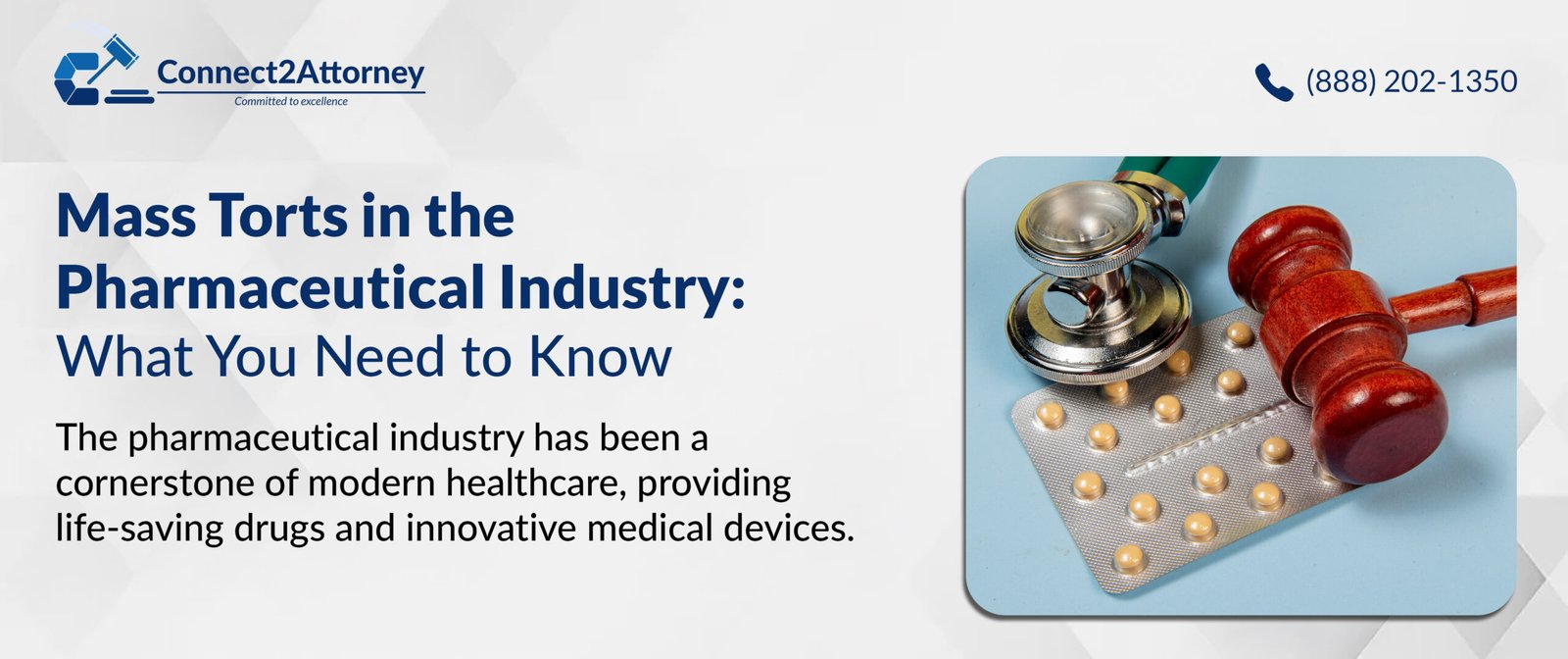Mass Torts in the Pharmaceutical Industry: What You Need to Know

 Mass Torts in the Pharmaceutical Industry: What You Need to Know
Mass Torts in the Pharmaceutical Industry: What You Need to Know
The pharmaceutical industry has been a cornerstone of modern healthcare, providing life-saving drugs and innovative medical devices. However, when these products fail to perform as intended or cause harm, the consequences can be devastating. Mass torts, a specific type of legal action, have become a crucial avenue for individuals harmed by defective drugs or medical devices to seek justice. This blog unpacks what mass torts are, explores notable cases in the pharmaceutical industry, and explains how victims can navigate this complex legal landscape.
What Are Mass Torts?
Mass torts involve numerous plaintiffs who have suffered similar injuries or damages due to a single product or action. Unlike class actions, where plaintiffs are grouped in a single case, mass tort cases are treated individually within the broader litigation. This structure ensures that each plaintiff’s unique circumstances are considered while benefiting from collective legal resources.
In the pharmaceutical industry, mass torts often arise when drugs or medical devices:
- Have undisclosed side effects.
- Are improperly tested before reaching the market.
- Fail to meet safety standards.
- Cause widespread harm after being approved.
Why Mass Torts Are Critical in Pharmaceuticals
The pharmaceutical industry is governed by stringent regulations from bodies like the U.S. Food and Drug Administration (FDA). Despite these safeguards, harmful products still slip through the cracks due to:
- Rushed Approvals: In some cases, drugs or devices receive expedited approval without comprehensive long-term testing.
- Corporate Negligence: Companies may prioritize profits over safety by ignoring red flags during clinical trials.
- Lack of Transparency: Critical side effects or risks are sometimes downplayed or omitted entirely from public disclosures.
When such scenarios occur, mass tort litigation becomes a vital tool for holding corporations accountable and providing justice for victims.
Notable Mass Tort Cases in the Pharmaceutical Industry
Several high-profile mass tort cases illustrate the profound impact defective drugs and medical devices can have on consumers. Here are three notable examples:
1. The Opioid Crisis
The opioid epidemic is one of the most devastating public health crises in recent history. Companies like Purdue Pharma faced mass tort lawsuits alleging that they downplayed the addictive nature of their products while aggressively marketing them. Settlements from these lawsuits have totaled billions, providing relief to communities ravaged by addiction.
2. Johnson & Johnson’s Talcum Powder
While talcum powder isn’t a pharmaceutical product, its connection to ovarian cancer made headlines. The lawsuits alleged that Johnson & Johnson knew about the cancer risks but failed to warn consumers. This case has become a cornerstone example of how large corporations can be held accountable through mass torts.
3. Defective Hip Implants
Medical device companies like DePuy Orthopaedics, a subsidiary of Johnson & Johnson, faced lawsuits over defective hip implants that caused pain, mobility issues, and the need for additional surgeries. Settlements in these cases highlighted the importance of rigorous testing for medical devices.
The Role of Regulatory Bodies
Regulatory bodies like the FDA aim to protect consumers by evaluating the safety and efficacy of pharmaceutical products. However, even with these safeguards, problems can arise:
- Approval Shortcomings: Some drugs and devices receive FDA approval based on limited data, especially under fast-track programs.
- Post-Market Surveillance Gaps: Ongoing monitoring may not quickly catch adverse effects once a product is on the market.
For consumers, this means staying vigilant and advocating for stronger safety measures within the industry.
How Victims Can Seek Justice
If you or a loved one has been harmed by a defective drug or medical device, taking action is crucial. Here are the steps to get started:
1. Recognize the Signs
Pay attention to any adverse effects or unusual symptoms that arise after using a drug or medical device. Common red flags include:
- Severe side effects not mentioned in the product’s literature.
- Worsening of the condition the product was supposed to treat.
- Pain, discomfort, or malfunction of implanted medical devices.
2. Consult a Medical Professional
Seek immediate medical advice to address any health issues and document the connection between your condition and the product.
3. Document Everything
Keep records of:
- Medical treatments and expenses.
- Communication with healthcare providers.
- Product packaging and usage instructions.
- Any correspondence with the manufacturer or distributor.
4. Connect with a Mass Tort Attorney
Specialized attorneys understand the complexities of mass tort litigation and can:
- Assess whether your case qualifies for a mass tort.
- Help you join existing litigation or initiate a new case.
- Guide you through the legal process and negotiate settlements.
What to Expect During a Mass Tort Case
Mass tort cases often follow these key phases:
- Investigation: Attorneys gather evidence, identify affected individuals, and build a collective case against the defendant.
- Consolidation: Cases are often consolidated in a single jurisdiction for efficiency.
- Litigation: Each plaintiff’s case is evaluated individually within the broader framework of the mass tort.
- Settlement or Trial: Many cases result in settlements, but some proceed to trial if an agreement cannot be reached.
Benefits of Joining a Mass Tort
Participating in a mass tort has several advantages:
- Cost-Effective Legal Representation: Legal fees are often contingency-based, meaning you pay only if you win.
- Access to Resources: Pooling resources with other plaintiffs strengthens your case.
- Increased Visibility: Mass tort cases attract attention, putting pressure on corporations to resolve claims.
Final Thoughts
Mass tort litigation plays an essential role in holding pharmaceutical companies accountable and compensating victims for their suffering. While the legal process can be daunting, it’s an invaluable tool for ensuring justice and driving change in the industry.
At Connect2Attorney, we specialize in connecting victims with experienced mass tort attorneys who can guide them through every step of the process. If you believe you’ve been harmed by a defective drug or medical device, don’t hesitate to reach out. Together, we can ensure your voice is heard and your rights are protected.








